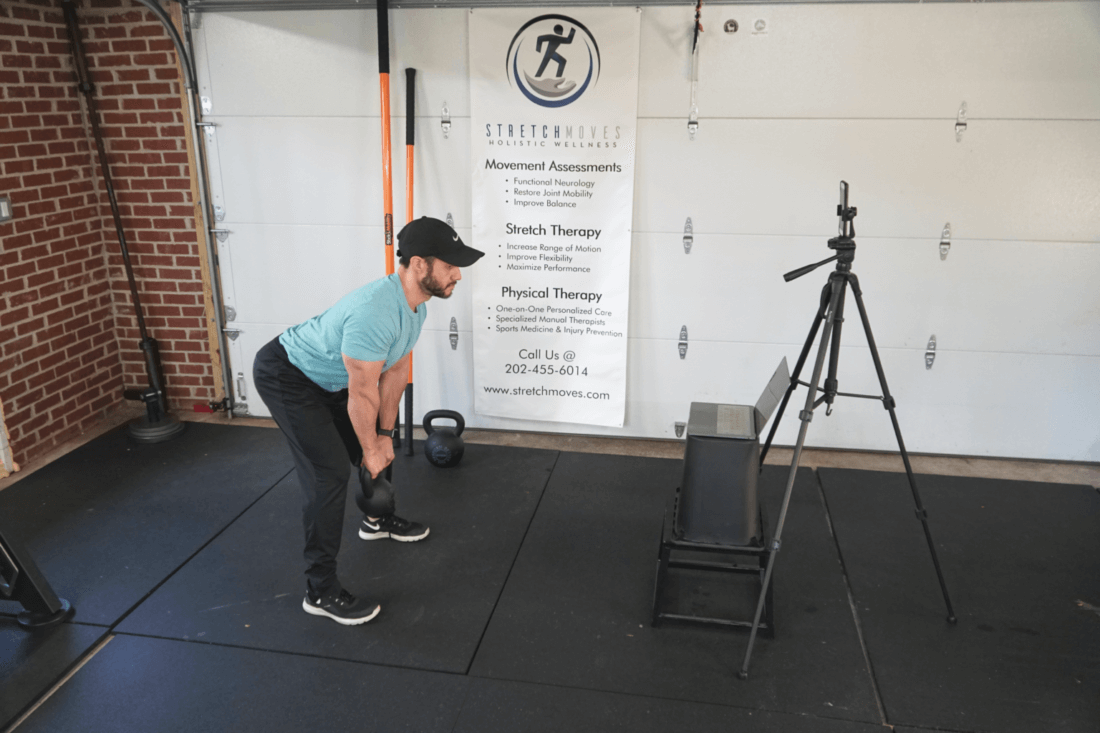
Owner Jose Chacon leads a virtual class.
For people like Jose Chacon, who owns and operates a small business in Fairfax, Virginia, the nation’s high unemployment rate is much more than a statistic.
Chacon and his wife, Jennifer Tillman, opened their holistic wellness practice in 2008. Together they use practices like stretch therapy, massage therapy and performance coaching to help people get out of pain. Before the pandemic, Chacon explained, they had multiple fitness classes along with appointments for a wide menu of different therapies.

“Now with everything that’s been going on, we’ve done a complete 180 turnaround and have completely redone and revamped everything that we offer, from what used to be hands on and in-person coaching to all virtual,” Chacon said in an interview with Dogwood.
His business, Stretch Moves Holistic Wellness, is now offering a variety of online classes to keep the community moving, even under stay-at-home orders.
“Having the opportunity to make a difference and have an impact on other people’s lives, just seeing the transformation whether it’s pain or lack of mobility, I love watching that transformation,” Chacon said.
But even with the transition to virtual classes, Chacon estimates about 90% of the business’ revenues have dropped since the beginning of the pandemic.
“We’re beyond the hurting phase,” Chacon said.
Although Virginia Gov. Ralph Northam didn’t officially close facilities like gyms until March 23, Chacon closed in-person operations on March 12.
“I didn’t want to transition to shorter days, we were just like, ‘We’re going to stand in front of this, we’re going to get ahead of this,’ because we’re so hands on,” Chacon said. “It’s very difficult to offer someone a massage or get to work on someone’s shoulder because you get too close [for social distancing], you’re obviously right next to someone.”

Unemployment in the United States has reached unprecedented levels, with the current rate higher than any time during the Great Depression. Many business owners like Chacon have turned to the coronavirus relief packages passed by Congress to help them stay afloat until the pandemic subsides.
The second round of coronavirus relief, passed in late March, allocated about $377 billion in funding for small businesses, along with direct payments to individuals and local governments. But that funding has been slow to reach small business owners, and in Chacon’s case, hasn’t been accessible at all.
Chacon explained that when he originally reached out to his bank to begin the process the bank claimed he needed to have an established business credit card or loan set up with them.
“But a week later I happened to call the bank because I had a technical difficulty with my direct deposit and they said, ‘Oh you know what we’ve changed that, even if you don’t have a credit card with us we will allow you to apply for the Paycheck Protection Program,” Chacon said. “But, now that it was 10 days later I’m already however many thousands of people behind in applying for the PPP.”
Difficulty accessing funds for small businesses and unemployment insurance has plagued many states as they get bogged down with an influx of cases their infrastructure was unprepared for. A total of 22 million Americans have filed for unemployment in the last four weeks, and research from the National Federation of Independent Businesses shows that 70% of small businesses have applied for the PPP.
Chacon’s case isn’t unique. Research from the NFIB shows that 84% of applicants that got PPP funding already had a checking or savings account with the bank through which they applied. Only 1% of successful applicants applied at a bank where they had no previous association. Applicants also faced challenges with their banks not accepting PPP applications, waiting for the bank to be ready to accept applications, or being told the bank had already reached its limit of accepting loans.
While banks work out the kinks, businesses don’t have time to wait. Disasters like this one are bad for business, research shows that about 40% of businesses don’t reopen after a disaster.
“From what I’ve heard and read in recent days it seems like the government is trying to get another bill passed but you know, the money from the first bills ran out like super quick,” Chacon said. “As far as finding help from government payments and loans there really isn’t a plan B for us.”

VIDEO: Your support matters!
Your support matters! Donate today. @vadogwoodnews Your support matters! Visit our link in bio to donate today. #virginianews #virginia #community...

Op-Ed: Virginia’s new Democratic majorities pass key bills to improve your lives, but will Youngkin sign them?
The 2024 Virginia General Assembly regular session has wrapped up. It was a peculiar session from the outset, with Democratic majorities in the...

Op-Ed: Why Virginia Needs A Constitutional Amendment Protecting Reproductive Freedom
Virginia’s recent election season in 2023 drew in eyes from all over the country. Reproductive freedom was on the line and Virginia remained the...

From the state rock to the state flower, here’s how Virginia got its symbols
Have you ever wondered why the Dogwood is the state flower? Or how the cardinal became the state bird? We’re here to answer those questions and more...

VIDEO: Second-gentleman Douglas Emhoff gives speech on reproductive freedom
Second gentleman, Douglas Emhoff touched on reproductive freedom not only being a woman's issue but "an everyone's issue" during the Biden-Harris...

Glenn Youngkin and the terrible, horrible, no good, very bad night
Election Day 2023 has come and gone, and while there are votes to be counted, one thing is perfectly clear: Virginians unequivocally rejected Gov....




